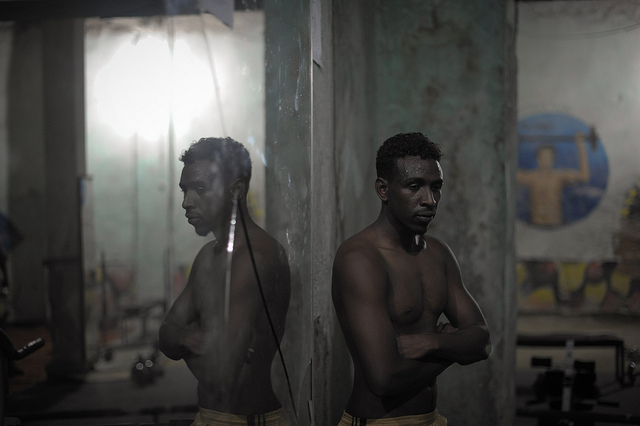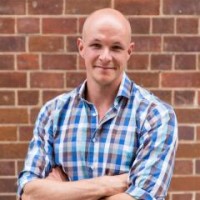Like many male teens, I was obsessed with getting jacked, or muscled.
Unfortunately, my genetics refused to follow the script. By age 18 I was still trying to burst through the 70 kg barrier, even though I had well and truly passed the 6 foot tall marker.
After high school, I began studying physiology and working at a gym, the perfect environment to fulfill my beefcake dreams. I read every muscle magazine, subscribed to every forum and swallowed every supplement I could get my hands on. I was the poster child for gym pop-culture, following the Lift, Eat, Sleep, Repeat program.
I was determined, focused, motivated and I pitied those who weren’t as strong as I was, either mentally or physically.
When I began avoiding social events because I didn’t trust myself with alcohol or “party food” I told myself that I was being healthy. In reality, I was stuck in the binge/diet/binge/diet cycle. I couldn’t afford to binge because it would mean even harder dieting would need to follow.
When I exercised so much that I tore my Achilles, I called it an “athlete’s injury.”
When I dieted so hard that my immune system crashed, I was more worried about losing muscle than I was about the long term damage I’d done to my adrenal system.
Most people find it hard to get motivated to go to the gym—I found it hard to convince myself to take a rest day. And even when I did have a day off, I didn’t rest. Maybe I’ll just go for a walk, I’d say. But before I knew it, I’d turn the walk into a jog and the jog into a run. Then, before long, I’d be racing to break my personal record.
My life revolved around two things: food and exercise. Sure I’d work, socialize and pursue hobbies, but they’d always be weighed up against my training goals.
If a hobby, like surfing, interfered with my recovery, I’d skip it. If a restaurant menu couldn’t provide the right macros (calorie balance), I’d wait until I got home. If a friend didn’t agree with my lifestyle, I’d find new friends.
During my third year at university we studied Body Dismorphic Disorder (BDD). I learned that despite research showing it affects men and women almost equally (ADAA), it is rarely spoken about in a male context.
I learned that estimates put the prevalence at around one percent of the population, although considering the significant stigmas associated with it, the real number could be a great deal higher.
I learned that sufferers are often highly skilled at hiding their symptoms. They use jargon to spin their unhealthy habits into Personal Development phrases and often surround themselves with like-minded individuals.
I’m not obsessed, I’m motivated.
I’m not consumed, I’m determined.
I’m not preoccupied, I’m focused.
The symptoms did sound familiar, but I dismissed them when I read that sufferers are also far more likely to use steroids.
I never used steroids.
I did, at times, consider giving myself an edge, but with my background in physiology, decided that the risks were far greater than the rewards. Using steroids risked burning out my adrenal system, and that sounded pretty bad. The way I saw it, my best bet would be to continue naturally until I hit my genetic limits, then I’d reassess the pros and cons.
Unfortunately, the decision was eventually made for me when, after five years of pushing my limits, I developed Adrenal Fatigue. In simple terms, I pushed until I broke my hormone system.
In hindsight, it’s incredible it took five years. I was cycling 20+ hours per week, weight training six hours a week, working two jobs and manipulating my need for sleep with pre-workout fuel (a potent combination of caffeine, creatine and sugar).
On the outside I was jacked, shredded and tanned (the other other obsession). However, on the inside, my body was progressively shutting down. My energy levels crashed, my focus disappeared and my libido vanished.
A healthy male’s testosterone should sit somewhere between 300 and 1200 ng/dL (according to the Mayo clinic). My levels were a flat 240. I had the hormone balance of a 70 year old.
Ironically, my endocrinologist recommended I begin a course of TRT (Testosterone Replacement Therapy). Essentially, I’d need to inject myself with steroids every other day. I’d also need to use DHEA lozengers twice a day, swallow thyroid medication daily, drip vitamin D onto my tongue and rub iodine into my skin. The regimen was inconvenient, but manageable.
The other part of her plan was much more difficult—no high-intensity exercise and no dieting. I was allowed to walk, stretch and swim, but nothing that elevated my heart rate above 60 percent. I had to eat a surplus of calories and I wasn’t allowed to consume anything that contained caffeine.
All of the gains I’d worked so hard for would slowly fade. It was my worst fears realized—I’d start losing muscle and gaining fat, and there was nothing I could do about it.
This sparked a major crisis of identity. If I wasn’t the fitness guy, who was I?
This question plagued me. Maybe I could be the business guy, or the yoga guy, or the travel guy. Maybe I should quit my life and begin again…
And that’s exactly what I did. In a moment of haste, I sold half of my possessions, moved house and agreed to attend a Vipassana Meditation Retreat. The retreat was a suggestion from one of my “spiritual” friends, which luckily came at a particularly vulnerable moment. At any other time I would have probably laughed it off as just another one of his kooky ideologies.
The retreat had a profound effect on me, in many ways. Shortly after returning, I wrote a review for elephant journal, which covers the base ideas and concepts of the experience.
However, the most profound realization took a little longer to arrive. A few months after the retreat, during one of my daily meditation sessions, it dawned on me that my goal was never simply to be big and lean—it was to be bigger and leaner. This constantly shifting goal post was the never-ending source of my unhappiness.
Just as boredom is the inability to enjoy what is in front of you, unhappiness is the inability to appreciate what you have.
So, even when my hormone levels balanced out and I was given the all clear to resume a modified workout program, I didn’t. Instead, I caught up on all of the things I’d deprived myself of for so many years. I surfed, ate nachos, drank beer and enjoyed rest days.
And despite all of this “weak” behaviour, the craziest thing happened: nothing. I didn’t blow out, or get fat, or become a lazy slob. Sure my body changed a little, but what changed more was my perception of it. I wasn’t as big or as lean, but finally, I was happy.
So while that little voice of self-criticism still occasionally pops up for air, it is now countered by a much larger voice, a voice that reminds me of three simple truths
>>> It doesn’t matter how many times you look, you will never find perspective in a mirror.
>>> Your biggest strengths are often hidden by your smallest flaws.
>>> You yourself, as much as anybody in the entire universe deserve your love and affection.
Final Word: BDD is a serious mental health issue.
It is unlikely that meditation alone will be effective as a treatment and may cause further distress. If you, or someone you know might be at risk, you can find more information on the ADAA website or take the Rhode Island Hospital self-test.
Relephant:
I Know Where All the Good Mirrors Are: An Honest Look at Body Dysmorphia.
Author: Garrick Transell
Editor: Catherine Monkman








Read 2 comments and reply